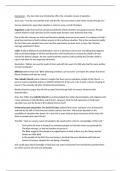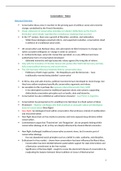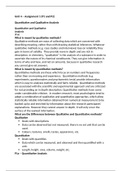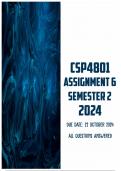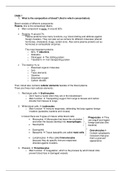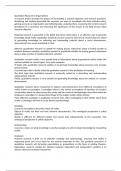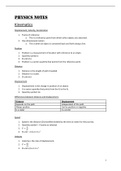IOS2601
CASES (Summary)
Statutes Cases
Summary Bundle
,Interpretation of Statutes
Cases (Summary)
National Coalition for Gay and Lesbian Equality:
In this case the constitutionality of S25(5) of the Immigration Act was
attacked. This section stated that if a resident of South Africa’s child
or spouse wanted to obtain immigration, it was possible. However, it
excluded partners in a same sex life partnership. The court found that
the word “spouse” should be read to include partners in a same sex
life partnership.
CC laid down a number of principles to be considered and followed
before severance and reading in is applied:
1. The result must be consistent with the constitution
2. It must interfere with existing law as little as possible
3. The courts must define how the legislative meaning should be
modified to comply with the constitution
4. Courts must be faithful to the purpose of the legislation
R v Sillas:
The amending act reduced the penalty after the accused had
committed the crime but before sentence was passed. The court found
that the presumption against retrospectivity had in this instance been
rebutted by the other considerations. The more lenient penalty was
imposed.
R v Mazibuko:
The court found that if a penalty provided for in an act is increased by
an amending act, the presumption against retrospectivity applies.
Here the appellant appealed against the death sentence imposed for
robbery. The previous act was amended after the crime was committed
but before sentence was passed. In terms of the amendment, the
death sentence could be imposed for robbery. The earlier more lenient
penalty was therefore imposed.
Grand Wholesalers v Ladysmith Metal Industry
The appellant was the defendant in an action instituted in the
Magistrate court by the respondent. The claim was for R 4 666.29.
The amendment to the Magistrate Court Act that increased the
monetary jurisdiction to R5000 only came into effect after pleadings
had closed. The appellant said that the court didn’t have jurisdiction.
The Magistrate stated that as it was procedural it did have
retrospective effect.
,On appeal the court held that there was no retrospectivity and the
Magistrates court did not have jurisdiction.
S v Koopman
The accused was found guilty in the Magistrate’s court on
Contravention of the Road Traffic Act and was sentenced to a fine and
the endorsement of his driver’s license.
On review the question was whether the endorsement was valid, as
the act had been repealed.
The provisions of the act providing for the suspension, endorsement
and rescission of a driver’s license hadn’t yet come into operation.
The court held that in terms of S11 of the Interpretation Act, the
provision providing for the endorsement was still in operation.
Estate Crosby v Wynberg Muncipality:
A valuation list was drawn up and an appraiser was sworn in. all of
this was properly done, but before the session of court could take
place, the authorizing act was repealed and replaced. The court
decided that the valuation list and the oath of the appraiser would
remain valid in terms of S12(2)(b).
Barlow’s Manufacturing Co Ltd v Metal Allied Workers Union:
The AD held that the right to appeal in terms of the repealed
legislation was a material right and not merely a procedural matter
and as such still applied.
Keagile v Attorney General Transvaal:
The appellant appeared in court in 1982 on the charge of
contravening the Internal Security Act. He was refused bail. The act
was then repealed and replaced. The defence argued that the AG
could not issue his declaration for the refusal of bail in terms of the
previous act because it was repealed before the declaration was made.
Nourse v Van Heerden:
During 1992, a gynaecologist and obstetrician from Durban was
charged in terms of the Abortion and Sterilization Act 2 of 1975 with
the performance of illegal abortions. His trial commenced on the 27
November 1992, but was not yet finished in 1997. On 1 July 1997, his
legal representative brought an application to have the charges
against his client dropped, since at that stage abortions were no
longer illegal and as a result his client’s actions did not constitute a
crime anymore.
, The physician’s legal representative based his application on the
following arguments:
• The provisions of the Abortion and Sterilization Act have not
been applied since the mid-nineties and as a result those
provisions had become abrogated by disuse
• The Abortion and Sterilization Act was repealed by the Choice on
Termination of Pregnancy Act 92 of 1996 in so far as it relates to
abortion and
• In terms of the fundamental values referred to in section 1 of the
Constitution, as well as the Bill of Rights, the prohibition on
abortions is in any event retrospectively unconstitutional.
The court found that legislation cannot be abrogated by disuse, and
must be repealed by competent legislation. Existing legislation
remains in force until repealed or declared unconstitutional. The trial
started before the repeal of the Abortion Act and in terms of section
12(2) the trial must be completed as if the Abortion Act had not been
repealed. Also the Abortion Act was never declared unconstitutional so
therefore the trial had to be completed in accordance with the law that
was in effect at the start of the trial.
R v Forlee:
F was found guilty of contravening Act 4 by selling opium – on appeal
his lawyer argue that F hadn’t committed an offence since the act in
question prescribed no punishment.
The court relied on the presumption against futility, finding that a
specific offence had been created by the legislation. The absence of a
penal clause doesn’t render the act ineffective since the court has a
discretion to impose a suitable form of punishment as it deems fit
This decision received widespread criticism because it was in conflict
with the rule = where there is no penalty there can be no crime
(nullum crimen sine lege).
It was argued that this rule was of greater fundamental NB and
should outweigh the fundamental principle.
S v Makhubela:
An accused was found guilty of driving a car without a licence where
he was behind the steering while the car was being pushed.
On review the court decided that the definition of the word “drive”
according to the Act was inadequate, but that the definition should
not be construed only according to its dictionary meaning but should
be understood in the context of the Act as a whole.
The conviction and sentence was set aside.
CASES (Summary)
Statutes Cases
Summary Bundle
,Interpretation of Statutes
Cases (Summary)
National Coalition for Gay and Lesbian Equality:
In this case the constitutionality of S25(5) of the Immigration Act was
attacked. This section stated that if a resident of South Africa’s child
or spouse wanted to obtain immigration, it was possible. However, it
excluded partners in a same sex life partnership. The court found that
the word “spouse” should be read to include partners in a same sex
life partnership.
CC laid down a number of principles to be considered and followed
before severance and reading in is applied:
1. The result must be consistent with the constitution
2. It must interfere with existing law as little as possible
3. The courts must define how the legislative meaning should be
modified to comply with the constitution
4. Courts must be faithful to the purpose of the legislation
R v Sillas:
The amending act reduced the penalty after the accused had
committed the crime but before sentence was passed. The court found
that the presumption against retrospectivity had in this instance been
rebutted by the other considerations. The more lenient penalty was
imposed.
R v Mazibuko:
The court found that if a penalty provided for in an act is increased by
an amending act, the presumption against retrospectivity applies.
Here the appellant appealed against the death sentence imposed for
robbery. The previous act was amended after the crime was committed
but before sentence was passed. In terms of the amendment, the
death sentence could be imposed for robbery. The earlier more lenient
penalty was therefore imposed.
Grand Wholesalers v Ladysmith Metal Industry
The appellant was the defendant in an action instituted in the
Magistrate court by the respondent. The claim was for R 4 666.29.
The amendment to the Magistrate Court Act that increased the
monetary jurisdiction to R5000 only came into effect after pleadings
had closed. The appellant said that the court didn’t have jurisdiction.
The Magistrate stated that as it was procedural it did have
retrospective effect.
,On appeal the court held that there was no retrospectivity and the
Magistrates court did not have jurisdiction.
S v Koopman
The accused was found guilty in the Magistrate’s court on
Contravention of the Road Traffic Act and was sentenced to a fine and
the endorsement of his driver’s license.
On review the question was whether the endorsement was valid, as
the act had been repealed.
The provisions of the act providing for the suspension, endorsement
and rescission of a driver’s license hadn’t yet come into operation.
The court held that in terms of S11 of the Interpretation Act, the
provision providing for the endorsement was still in operation.
Estate Crosby v Wynberg Muncipality:
A valuation list was drawn up and an appraiser was sworn in. all of
this was properly done, but before the session of court could take
place, the authorizing act was repealed and replaced. The court
decided that the valuation list and the oath of the appraiser would
remain valid in terms of S12(2)(b).
Barlow’s Manufacturing Co Ltd v Metal Allied Workers Union:
The AD held that the right to appeal in terms of the repealed
legislation was a material right and not merely a procedural matter
and as such still applied.
Keagile v Attorney General Transvaal:
The appellant appeared in court in 1982 on the charge of
contravening the Internal Security Act. He was refused bail. The act
was then repealed and replaced. The defence argued that the AG
could not issue his declaration for the refusal of bail in terms of the
previous act because it was repealed before the declaration was made.
Nourse v Van Heerden:
During 1992, a gynaecologist and obstetrician from Durban was
charged in terms of the Abortion and Sterilization Act 2 of 1975 with
the performance of illegal abortions. His trial commenced on the 27
November 1992, but was not yet finished in 1997. On 1 July 1997, his
legal representative brought an application to have the charges
against his client dropped, since at that stage abortions were no
longer illegal and as a result his client’s actions did not constitute a
crime anymore.
, The physician’s legal representative based his application on the
following arguments:
• The provisions of the Abortion and Sterilization Act have not
been applied since the mid-nineties and as a result those
provisions had become abrogated by disuse
• The Abortion and Sterilization Act was repealed by the Choice on
Termination of Pregnancy Act 92 of 1996 in so far as it relates to
abortion and
• In terms of the fundamental values referred to in section 1 of the
Constitution, as well as the Bill of Rights, the prohibition on
abortions is in any event retrospectively unconstitutional.
The court found that legislation cannot be abrogated by disuse, and
must be repealed by competent legislation. Existing legislation
remains in force until repealed or declared unconstitutional. The trial
started before the repeal of the Abortion Act and in terms of section
12(2) the trial must be completed as if the Abortion Act had not been
repealed. Also the Abortion Act was never declared unconstitutional so
therefore the trial had to be completed in accordance with the law that
was in effect at the start of the trial.
R v Forlee:
F was found guilty of contravening Act 4 by selling opium – on appeal
his lawyer argue that F hadn’t committed an offence since the act in
question prescribed no punishment.
The court relied on the presumption against futility, finding that a
specific offence had been created by the legislation. The absence of a
penal clause doesn’t render the act ineffective since the court has a
discretion to impose a suitable form of punishment as it deems fit
This decision received widespread criticism because it was in conflict
with the rule = where there is no penalty there can be no crime
(nullum crimen sine lege).
It was argued that this rule was of greater fundamental NB and
should outweigh the fundamental principle.
S v Makhubela:
An accused was found guilty of driving a car without a licence where
he was behind the steering while the car was being pushed.
On review the court decided that the definition of the word “drive”
according to the Act was inadequate, but that the definition should
not be construed only according to its dictionary meaning but should
be understood in the context of the Act as a whole.
The conviction and sentence was set aside.


